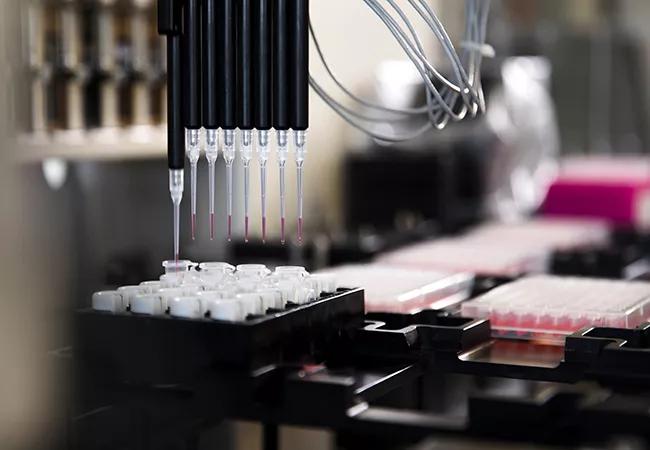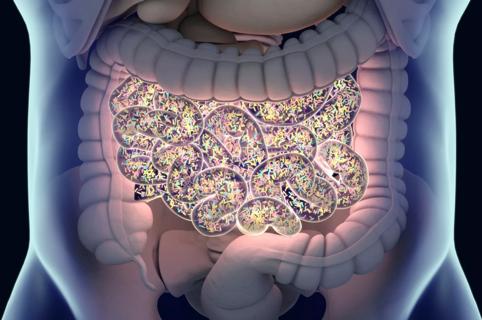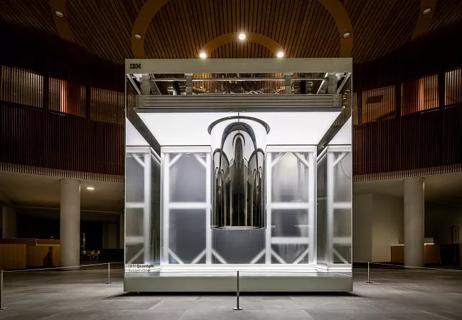Cleveland Clinic and PGDx employ liquid biopsy technology to enhance patient care and research

Cleveland Clinic is enhancing its tumor-profiling capabilities by harnessing the diagnostic power of liquid biopsy. Scientists at the Center for Immunotherapy and Precision Immuno-Oncology and Lerner Research Institute have teamed with Personal Genome Diagnostics Inc. (PGDx) to develop new liquid biopsy methods and assay iterations. The goal is to elevate the standard of care and increase the use of precision diagnostics within the cancer care continuum.
Advertisement
Cleveland Clinic is a non-profit academic medical center. Advertising on our site helps support our mission. We do not endorse non-Cleveland Clinic products or services. Policy
“Liquid biopsies allow us to diagnose a cancer, survey it and see how well it’s responding to treatment,” explains Cleveland Clinic researcher Shadi Swaidani, MD, PhD. “Unlike traditional biopsies, which can be quite invasive, this new approach only requires a simple blood draw.”
Liquid biopsies analyze circulating tumor DNA, which is released by tumor cells. A single blood draw allows scientists to sequence more than 500 genes.
“Liquid biopsy is one of the most rapidly growing areas of molecular diagnostics and precision medicine,” says Timothy Chan, MD, PhD, Director of the Center for Immunotherapy and Precision Immuno-Oncology. “There is a lot of research activity underlying this very promising clinical tool.”
Cleveland Clinic has established an on-site program dedicated to performing liquid biopsies and analyzing circulating tumor DNA. Led by Dr. Swaidani, it is the only such program in northeast Ohio of its kind. Liquid biopsies are particularly well-suited for serial biopsies, hard-to-reach tumors and patients with numerous lesions or advanced-stage cancer who require repeat tests.
“The program will give patients access to groundbreaking technologies being trialed at Cleveland Clinic while simultaneously providing our researchers with the raw data required to further those technologies,” explains Dr. Chan.
Dr. Swaidani has also launched a pilot program with Cleveland Clinic’s Cole Eye Institute designed to analyze liquid biopsies in patients with uveal melanomas. In collaboration with Dr. Arun Singh, Director of the Department of Ophthalmic Oncology, the pilot team has enrolled patients in the study and is conducting initial research, hopes to have data within the first quarter of 2022.
Advertisement
“We are discussing the technology with almost every oncology group on campus. I think circulating tumor DNA is going to be an important link between clinicians and translational scientists that will enhance our cancer research,” says Dr. Swaidani.
Liquid biopsy platforms will allow all clinical institutes at Cleveland Clinic to ask important questions about the following:
“Innovation is an important part of cancer treatment, and this collaboration reflects Cleveland Clinic’s commitment to continual innovation,” says Dr. Chan.
In addition, the new program represents the healthcare organization’s dedication to the burgeoning field of precision medicine. Cleveland Clinic also recently expanded its genomic testing capabilities to provide molecular tumor profiling that involves whole exome sequencing.
“Circulating tumor DNA assays are one very important brick in the foundation of precision medicine,” he says.
Advertisement
Advertisement

First full characterization of kidney microbiome unlocks potential to prevent kidney stones

Researchers identify potential path to retaining chemo sensitivity

Large-scale joint study links elevated TMAO blood levels and chronic kidney disease risk over time

Investigators are developing a deep learning model to predict health outcomes in ICUs.

Preclinical work promises large-scale data with minimal bias to inform development of clinical tests

Cleveland Clinic researchers pursue answers on basic science and clinical fronts

Study suggests sex-specific pathways show potential for sex-specific therapeutic approaches

Cleveland Clinic launches Quantum Innovation Catalyzer Program to help start-up companies access advanced research technology